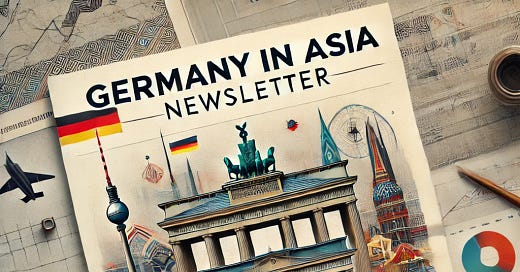Welcome to this week’s edition of the Germany in Asia newsletter. We take a look at the evolving EU-China trade dynamic, as Brussels navigates potential US tariffs while exploring economic ties with Beijing. Meanwhile, India and the EU are working through trade barriers as New Delhi’s exports hit record highs.
Economy
EU Shifts Stance on China Amid US Trade Tensions
As the EU braces for potential US tariffs, European Commission President Ursula von der Leyen has softened her approach to China, signaling a willingness to expand trade ties while maintaining economic security measures.
With Trump threatening trade penalties, the EU is exploring agreements with Beijing to balance economic interests. Trade Commissioner Maros Sefcovic stressed that while cooperation with the US continues, Europe will also push back against China’s trade imbalances.
Von der Leyen’s shift is seen as a strategic message to Washington, asserting that Europe has alternative economic options, though some warn its security reliance on the US limits flexibility.
Source: SCMP
India Engages with EU on Trade Barriers Amid Record Export Growth
India is in talks with the European Union (EU) to resolve issues related to new trade regulations, including deforestation laws and non-recognition of Indian quality certifications, Commerce Minister Piyush Goyal stated in the Rajya Sabha. He assured that India will strongly oppose any unfair trade barriers through bilateral discussions and multilateral forums.
The EU is India’s third-largest trading partner, with bilateral trade exceeding USD 130 billion in 2023-24. Ongoing negotiations for a Free Trade Agreement (FTA) aim to expand market access and ease regulatory hurdles. Despite global uncertainties, India’s exports are set to surpass USD 800 billion in 2024-25, a historic high. Goyal emphasized that India’s trade position remains strong, with forex reserves consistently above USD 600 billion.
India is pushing for mutual recognition of certification labs to simplify trade compliance and prevent unfair restrictions. With trade talks progressing, both sides seek a balanced and fair regulatory framework to strengthen economic ties.
Source: Business Standard
Neon Eyes Expansion in Europe Amid Economic Uncertainty
Singapore’s Neon Group is expanding its immersive entertainment business into Europe, with Germany and Franceamong potential locations for new permanent venues. CEO Ron Tan confirmed the company’s interest in establishing a presence in these markets despite economic challenges, including Germany’s slow growth and high energy costs.
Neon, known for exhibitions such as “Jurassic World” and “Ramses and the Gold of the Pharaohs,” has already toured major European cities and reports annual revenue growth of 20-30%. The company’s strategy focuses on mid-priced entertainment, which it sees as resilient to inflation and weaker consumer spending.
With its first permanent venue opening in Tokyo in March, Neon is now looking at Paris and an unspecified German city as part of its broader expansion into developed markets. While economic growth in the eurozone remains sluggish, the company sees continued demand for cultural and interactive experiences across Europe.
Source: Nikkei
Defense
India Joins Eurodrone Program as Observer Amid Project Advancements
India has been granted observer status in the Eurodrone program, joining Japan in monitoring the four-nation initiative led by Italy, France, Germany, and Spain. Managed by OCCAR, the program aims to develop a Medium-Altitude, Long-Endurance (MALE) drone to enhance Europe’s autonomous drone capabilities.
Developed by Airbus, Dassault Aviation, and Leonardo, the Eurodrone will feature a 26-meter wingspan, 40-hour endurance, and a 2.3-ton payload. It will be capable of operating in non-segregated airspace, carrying weapons, and executing ISTAR, anti-submarine warfare, and electronic warfare missions.
Initially set for a 2025 launch, the program has faced delays, with service entry now expected in 2029.
Source: Defense News
Germany-India Submarine Deal: Shift Away from Russia or Strategic Cooperation?
Germany’s Thyssenkrupp Marine Systems (TKMS) and India’s Mazagon Dock Shipbuilders (MDS) have received approval to proceed with negotiations for a $5.2 billion deal to build six advanced submarines for the Indian Navy. While the agreement aligns with India’s push for domestic defense production, it does not necessarily signal a reduction in reliance on Russian arms, experts say.
India remains the world’s largest arms importer, with 36% of its defense imports from Russia between 2019 and 2023, though this is a decline from 69% in 2012-2016. The partnership with Thyssenkrupp follows previous Indo-German defense collaborations, including submarine construction in the 1980s.
The deal reflects India’s interest in diversifying its suppliers while strengthening European defense ties, particularly after Prime Minister Narendra Modi and German Chancellor Olaf Scholz agreed in 2023 to deepen technological and military cooperation. However, analysts argue that India’s dependence on Russia’s low-cost systems, technology transfers, and spare parts will keep the partnership intact despite new European collaborations.
Source: DW
Politics
Sri Lanka Probes Tourist Deaths After Suspected Pesticide Poisoning
Sri Lankan police are investigating the deaths of a 24-year-old Briton and a 26-year-old German after suspected poisoning from a recent fumigation at their Colombo hostel. The Briton, Ebony McIntosh, died on February 2, the same day she arrived, while the German woman died a day later. A German man remains hospitalized.
Authorities are testing for toxic exposure from the pesticide treatment for bedbugs, and the hostel has been closed by police. McIntosh’s family has launched an online fundraiser to bring her body home, expressing their devastation over her sudden death.
Source: SCMP
Thanks for reading, and stay tuned for more updates on Germany’s role in Asia’s shifting economic, defense, and political landscape.



